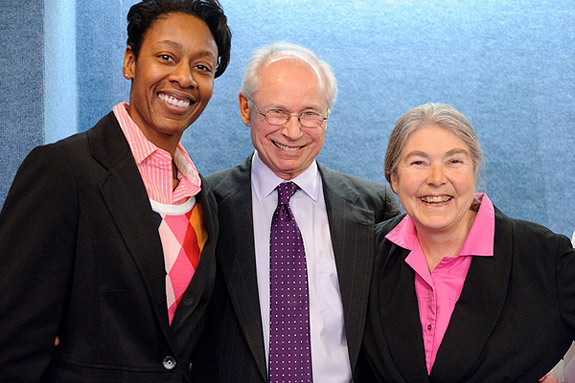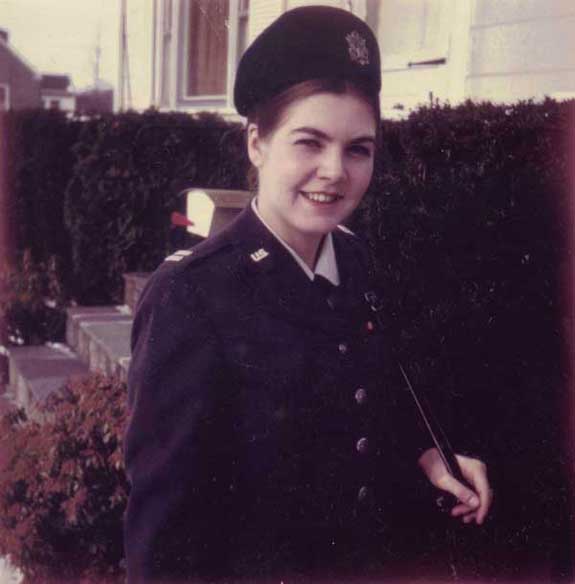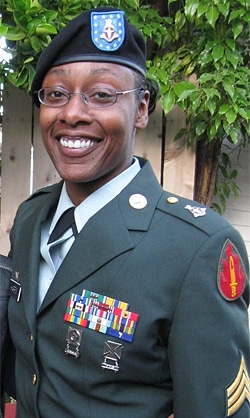A Look Back: Landmark SPLC Case Changed Legal Landscape for Women’s Rights
Sharron Cohen's case against the Air Force was one of the SPLC’s first major civil rights lawsuits. It turned into a landmark victory in the struggle for women’s rights, altering the legal landscape for women fighting to end gender-based discrimination.
Sharron Cohen was 23 years old when she walked into Joe Levin’s office – and she was angry.
The lieutenant at Maxwell Air Force Base in Montgomery, Ala., had gotten married about a year earlier, in late 1969, and had applied for an increased housing allowance and medical benefits for her husband.
Such benefits were automatically granted to married men in the Air Force. But she was a woman. She wasn’t eligible.
Cohen was hoping Levin, a civil rights lawyer who founded the Southern Poverty Law Center with Morris Dees in 1971, could write a letter and get the decision reversed.
It wasn’t that simple.
“He told me we were dealing with the inequality of law,” Cohen said. “The only remedy was a lawsuit that would force a change in the statute.”
Levin took the case – one of the SPLC’s first major civil rights lawsuits. It turned into a landmark victory in the struggle for women’s rights, altering the legal landscape for women fighting to end gender-based discrimination.
The U.S. Supreme Court’s 8-1 ruling that the policy was unconstitutional, in 1973, is recognized as the first successful sex discrimination case against the federal government. It was also the first time the Court had applied the due process clause of the Fifth Amendment to enforce equal rights for women and only the second time the Court had decided in favor of women’s rights.
Though she’s remained largely out of the limelight since that ruling, Cohen recently jumped at the chance to speak out on another SPLC case involving inequality in the military. She appeared at a recent press conference in Washington, D.C., on behalf of a veteran not unlike herself, Tracey Cooper-Harris.
The SPLC has filed a federal lawsuit challenging the constitutionality of the federal Defense of Marriage Act (DOMA) as well as the law that governs the Department of Veterans Affairs policy.
Practically everything about the Cooper-Harris case and Cohen’s case is the same, Levin said.
“It’s a marriage that, for purposes of the military, is not recognized,” Levin said. “Benefits that would otherwise be granted to our client or to any other legally married person are not being allowed. The bottom line is no different.”
Fighting an unfair law
Like Cooper-Harris, Cohen was enthusiastic about pursuing legal action to change an unfair law.
Her whole life, she had done everything by the book, she said. She had graduated from the Air Force Institute of Technology and begun working as a physical therapist at the hospital at Maxwell AFB.
“I wasn't a feminist when we initially filed the lawsuit,” she said. “I wasn't politically aware of much of anything. But when my eyes and ears opened, they opened to everything around me.”
At the time, Maxwell had no housing for married officers, so she and her husband had to live off base. Married officers were entitled to an extra payment to support the off-base housing.
But, as a woman, Cohen was required to prove that she provided more than half of the living expenses for her husband, Joseph Frontiero, a Navy veteran who was attending college and working part-time. Since his income and educational benefits under the GI Bill amounted to more than half of his expenses, Cohen didn’t quality.
Cohen was worried about how she might be treated by her colleagues on base because of her decision to file the lawsuit. To her surprise, she was treated very well, though she did receive a death threat.
“I think the lawsuit actually protected me from being transferred,” she said. “Also, Maxwell was, and still is, the site of the Air University, so there tended to be more people there who were educated and intellectual than there might have been on other bases.”
Levin described Cohen both then and now as “courageous” and willing to do whatever it took to reverse the unfair law.
The initial court decision in the case, Frontiero v. Richardson, did not go well. A three-judge panel of the U.S. District Court for the Middle District of Alabama issued a 2-1 decision in favor of the Department of Defense. The lone dissent came from Judge Frank M. Johnson Jr., famous for issuing a series of landmark decisions that helped end racial segregation in the South.
Levin attributed that loss to the conservative nature of the court.
“I’d hoped they would go with us, but it was very illustrative of the lines that were drawn back then in the eyes of judges and society as a whole about discrimination on the basis of sex,” Levin said.
Women ‘in a cage’
The case was appealed to the U.S. Supreme Court, which agreed to hear it. Levin allowed the ACLU Women’s Rights Project, which had filed an amicus brief, to participate in the oral argument. Arguing on behalf of the ACLU was Ruth Bader Ginsburg, later appointed to the Court by President Bill Clinton.
When the decision came, only Justice William Rehnquist dissented from the majority opinion that the Air Force policy was a violation of Cohen’s rights.
“There can be no doubt that our Nation has had a long and unfortunate history of sex discrimination,” wrote Justice William J. Brennan in the ruling. “Traditionally, such discrimination was rationalized by an attitude of ‘romantic paternalism’ which, in practical effect, put women, not on a pedestal, but in a cage.”
Afterward, Cohen found herself somewhat of a small-town celebrity in Montgomery. She spoke to students, gave interviews and was sometimes recognized on the street.
She and her husband divorced not long after the case was over, and she retired from the Air Force after four years of service, continuing to work as a physical therapist. Over the years, she has also managed a crafts shop, run an elementary school library and bookmobile, and published four romance novels.
Today, she lives in Massachusetts with her husband of 33 years. They enjoy kayaking, cross-country skiing and volunteering as lighthouse keepers each summer.
Cohen believes the SPLC lawsuit seeking justice for Tracey Cooper-Harris is a logical extension of the legal battle she fought.
“Forty years ago, I was unwilling to have my work and commitment to this country considered second-class,” Cohen said. “Today, Tracey is fighting the same battle. It is time to end this double standard and respect the military service of all Americans.”



